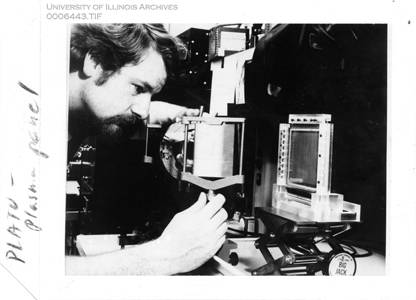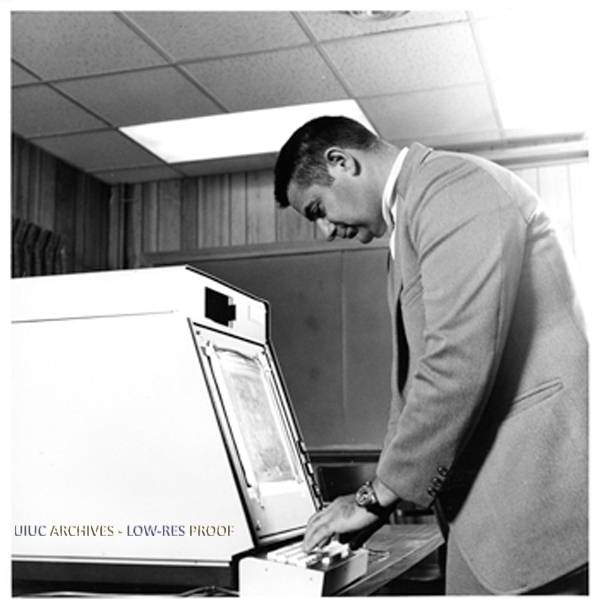 It was called “the friendly orange glow.” And no I’m not talking about the orange lighting of the State Farm Center or Memorial Stadium, I’m talking about the eerie orange campfire-like essence given off by the plasma panel terminals of PLATO. If you’re not familiar with PLATO, which I was not until just a few weeks ago, then you are the reason Brian Dear has undertaken a decades long project of writing a book about it. PLATO stands for Programmed Logic for Automatic Teaching Operations, and it was a computer based project started at the University of Illinois in 1960. Dear, an internet entrepreneur and author of the new book The Friendly Orange Glow, took an early interest in the project and dedicated years to researching and interviewing the people who gave it life. According to Dear, his reason for writing the book was to “give PLATO its due and get it into the conversation and culture. The people that built it and designed it are just as brilliant and important as Steve Jobs and Bill Gates and Alan Kay.” The book reads like a story, with a unique cast of characters, and folks who have any time invested in the University of Illinois or Champaign-Urbana will find the deep local connections fascinating.
It was called “the friendly orange glow.” And no I’m not talking about the orange lighting of the State Farm Center or Memorial Stadium, I’m talking about the eerie orange campfire-like essence given off by the plasma panel terminals of PLATO. If you’re not familiar with PLATO, which I was not until just a few weeks ago, then you are the reason Brian Dear has undertaken a decades long project of writing a book about it. PLATO stands for Programmed Logic for Automatic Teaching Operations, and it was a computer based project started at the University of Illinois in 1960. Dear, an internet entrepreneur and author of the new book The Friendly Orange Glow, took an early interest in the project and dedicated years to researching and interviewing the people who gave it life. According to Dear, his reason for writing the book was to “give PLATO its due and get it into the conversation and culture. The people that built it and designed it are just as brilliant and important as Steve Jobs and Bill Gates and Alan Kay.” The book reads like a story, with a unique cast of characters, and folks who have any time invested in the University of Illinois or Champaign-Urbana will find the deep local connections fascinating.
 Last week, I spoke with Dear over the phone about the PLATO project and the process of writing the book.
Last week, I spoke with Dear over the phone about the PLATO project and the process of writing the book.
Smile Politely: You describe yourself as a “serial internet entrepreneur. Tell me a bit about your background and how that led to your interest in internet start-ups.
Brian Dear: Actually I blame PLATO for everything. I got my start with computers totally by accident at the University of Delaware when I was a freshman in 1979. I enrolled as an English/Journalism double major; I come from five generations of newspaper publishers and editors. But within a week, I stumbled on the PLATO system which was all over the campus at Delaware, and I just couldn’t believe that things were so futuristic. It wasn’t that it was a fancy system for word processing or number crunching, it was all people. It was a community like we would take for granted today. It blew me away. That was my first real exposure. I worked in the field of computer based education and training for the next five years. Then my wife and I decided to start a company inspired by PLATO, as we were frustrated by things like the Apple Macintosh which was very cool, and the apps were all beautiful and graphical, but when you connected to another computer and went online all of that wonder disappeared and it was scrolling text and very boring. My first start-up was called Coconut, named deliberately and inspired by Apple. We figured you could live longer on a coconut than an apple on an island. Every start up I’ve been involved in since, I still carry a lot of influence from what I saw on PLATO.
SP: You worked for PLATO for a time, correct?
Dear: Basically within a few weeks of being at Delaware, I discovered you could take classes and learn how to program, then you could get a job at the University of Delaware PLATO Project. They were an organization that supported the system, and they were hiring students galore. I thought, “you mean I can get paid to have fun?” This is exactly what had been happening at Illinois for years. In 1980 I made my first trip out to Illinois, and started to do interviews for the book in ’85-’86.
SP: Wow, so this has been quite an undertaking.
Dear: If you do a serious investigatory, non fiction book, the way you’re supposed to do it is you write up a proposal, submit it to a publisher, they accept it, and then they give you a nice big fat advance, then you go off for a year or two and do all the research and then you write the book. Well I had no book and no idea, but I knew that there was a story, and I was eager to find it and frustrated that no one else was pursuing it. So I basically footed the bill myself to do all the research for years. I would work on the book for a few years, shelve it, then work on a start-up for a few years to make an income and have a day job, then go back to working on the book. That was the pattern from the late eighties to about 2012. Across 32 years, the book probably took 11 years to work on.
SP: So what exactly is PLATO?
Dear: It was developed at the U of I in 1960, and the original idea was to build a computer that faculty members could create lessons on to teach their students in any subject imaginable. That was the original mission. They started so early that they had to invent everything, including a display for a student to sit down in front of, and that became the gas plasma flat panel display. It’s the same as plasma televisions that we mount on the wall, and there are probably still tons of them all over the campus today. By 1972, PLATO started their installations of them and ended up installing over 1700 terminals over the course of 5-10 years.

PLATO plasma panel (University of Illinois Archives)
Dear: Here’s how PLATO got so interesting. When the high school kids and undergrads got their hands on PLATO around 1973, in the span of 12 months they added everything you could imagine that we take for granted today to the system. (The book details the involvement of local high school students on the PLATO project. Don Bitzer, the project leader, brought in students from Urbana High School, University High School, and eventually Springfield High School to work on the project. According to Dear, this was unusual in this time when labs were typically kept under lock and key and only accessible to “experts”.) Chat rooms, instant messaging, message forums, graphic multi-player games, email, all kinds of communication and suddenly the system was not just for education. What’s notable is that C-U was decades ahead of most of the world in terms of having a digital life. People were obsessed with PLATO, and addicted to it. There was a thriving culture all over C-U in the high schools and on campus that was not really replicated in the same way anywhere else. I think that’s one of the reasons the PLATO story never became commonplace.
SP: This story certainly had a cast of characters. There were so many unique personalities involved in this project. Who are a few of the folks who you feel had the biggest impact on advancing the work of PLATO.
Dear: The first name has to be Don Bitzer. He was the leader of the project, and was hand picked to start it in 1969 when he was just 26 years old. He was considered by his peers and seniors to be a brilliant engineer, and he was also kind of wild and crazy and very ambitious, and set the pace for the PLATO project for the next few decades. He really believed in young people, and had no qualms about bringing in high school kids who were smart and willing to be turned loose. As long as you could build something and contribute, you were welcome. On the administrative side, Dan Alpert played a crucial role in protecting the PLATO project and getting it money for many years. In terms of the young people, there was Bruce Parello, a.k.a “The Red Sweater”, and he represents to me what would happen to millions of people years later who may have been kind of shy in person, but when they were turned loose online they found they could create a persona and flourish. He created News Report, which was one of the first online newspapers that created original content.

Don Bitzer (University of Illinois Archives)
PLATO was basically the precursor to every online experience we’ve become accustomed to today…email, instant messaging, online gaming, and even online dating (Dear met his wife in a chat on PLATO). It even had the addictive factor we opine about today. Turns out we’ve always been wired for this stuff…pun intended.
“Here’s a system that was designed for education, to improve the lives of grade schoolers, high schoolers, and college students, and it ended up wrecking the academic lives of many students who flunked out,” says Dear. “For a lot of kids the most interesting subject on PLATO became PLATO. PLATO represents an interpersonal computer revolution that happened before the personal computer revolution. It took many years for the PCs to evolve into being interpersonal, and yet PLATO was there way before.”
Brian Dear will be on campus next Tuesday, November 14 for a book launch at the Alice Campbell Alumni Center. The event will take place in the ballroom from 6:30-8:30 p.m. There will be a presentation by Dear, reading from the book, a Q&A session, and book signings. Illini Union Bookstore will be on hand with copies for sale. You can register to attend here.
Featured photo from The Friendly Orange Glow Facebook page.








